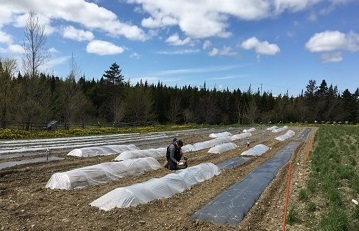Set up an interview
Media Relations
Agriculture and Agri-Food Canada
1-866-345-7972
aafc.mediarelations-relationsmedias.aac@agr.gc.ca
With climate change becoming a more prominent issue in the world, many people are concerned about how it will affect agriculture – and by extension – food supply. Farmers are at the mercy of Mother Nature and irregular rainfall and heat waves can make or break crops across the country.
By looking at how plants respond to environmental stresses, plant physiologists across Canada are working to help ensure Canadian farmers can grow successful crops year after year. By focusing on physiological traits and how they respond under stress, researchers are working closely with breeders to develop plant varieties that can better perform under extreme climates.
From the Atlantic provinces to the prairies and all the way to British Columbia, Agriculture and Agri-Food Canada (AAFC) plant physiologists are working together to evaluate plant varieties that will succeed through a variety of environmental stresses in the future.
Plant Physiology on the Prairies
In Saskatchewan, AAFC research scientists Raju Soolanayakanahally and Jatinder Sangha have spent years researching prairie crops and how they react to stresses. By collaborating with plant breeders, they are poised to identify physiological traits that improve crop yields and prepare for climate change across the Prairies.
Plant physiologist Raju Soolanayakanahally’s research is focused on canola and how it’s affected by drought and heat stresses. Combinations of these two stresses can decrease crop yields significantly costing farmers’ money and resources. Identifying canola lines that use water and nitrogen more efficiently is a key step to improving yields under stress conditions. “We’re screening large numbers of canola lines to determine which ones can make the most stress-resilient crops,” says Soolanayakanahally. “Stress-resilient crops save farmers’ money and resources, helping Canadian farmers succeed even through climate change.”
Located in southern Saskatchewan, Jatinder Sangha is focused on wheat, a common crop of the semi-arid prairies. “We’re working to create better varieties for farmers,” says Sangha, “Improving crop resiliency, productivity, quality and profits are areas that growers can get excited about.” Sangha is also involved in research about how to improve screening of Deoxynivalenol (DON), a toxin produced by Fusarium head blight disease in wheat that affects crop growth, and is supporting the work to develop plant breeds resistant to disease. By collaborating with wheat breeders, plant pathologists, geneticists, biochemists, and even engineers at AAFC, these experts are driving innovation that helps Canadians.
Growing through the frost
Julia Wheeler, an AAFC research scientist based out of Newfoundland and Labrador, is focused on helping to enhance food security in partnership with people living in Northern communities. With many growers in northern Canada facing unique challenges such as a shorter growing season, colder average temperatures, and limited supply chains, food production possibilities are more narrow than other areas of Canada. As an eco-physiologist, Julia Wheeler is working with communities to overcome these challenges and create community-driven solutions. “It’s important to engage with communities to identify what their food production priorities are – no two communities are alike. Co-development of projects between Northern communities and AAFC is an ongoing process,” said Wheeler.
To overcome the challenges associated with farming in the north, cold-resistant plant varieties are evaluated, as are season extension technologies. By collaborating with community members and growers who have been long working on these issues, AAFC can create shared priorities and help develop solutions for food insecurity in Northern communities.
Practice Makes Perfect
Across Canada in British Columbia, Dr. Hao Xu is aiming to learn more about the stresses that apple and sweet cherry trees face throughout growing seasons. With climate change unpredictably impacting plant health and fruit production, Xu is working to develop practices to mitigate plant stress. By using the right rootstocks, training the canopy, and adjusting leaf-fruit ratios, plant physiologists can help improve the resilience of crops. “It’s critical for us to figure out exactly what is causing the crops’ stress,” says Xu. “Once we learn the cause, we can fine-tune these horticultural practices to sustain yield and improve fruit quality.”
Plant physiology is not an independent science. AAFC researchers are in constant collaboration to determine best practices and see real-world outcomes to their research. “Working with scientists of a diverse agricultural and agri-food expertise empowers us make more precise predictions and comprehensive recommendations,” says Xu.
Key Discoveries/Benefits:
- Plant physiologists across Canada are working with breeders to identify climate-resilient crops.
- Stress-resistant crops can save Canadian famers millions in annual losses.
- Climate change is predicted to have a unique effect on different communities across the country, and it’s vital to create community-driven solutions to help farmers.
Photo Gallery:


